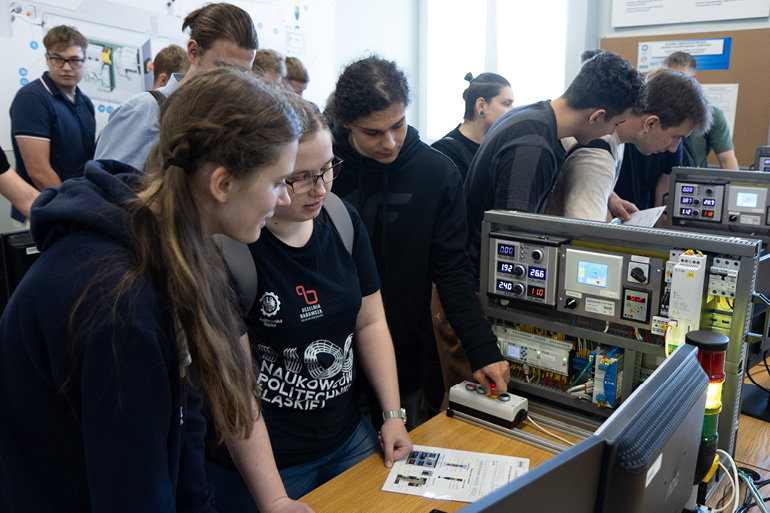Start - Aktualności - Modern laboratory of industrial automation opened at the Faculty of Electrical Engineering

Modern laboratory of industrial automation opened at the Faculty of Electrical Engineering
The innovative laboratory of industrial automation is the result of cooperation between the Silesian University of Technology and Eaton, the patron of the laboratory, a world leader in products, systems and services related to electricity management. The laboratory is equipped with the most modern equipment available on the market, to help future automaton engineers acquire practical and key skills for their profession.
The new lab features eight workstations with Eaton’s latest equipment installed. This equipment is to help future automation systems, e.g. in programming PLC controllers, creating visualizations for HMI operator panels or learning industrial communication protocols. The stations have been prepared in such a way as to enable their expansion with new functions in the future.
– Currently, the labour market is changing very dynamically, and this can also be seen in the expectations of employers toward university graduates. We are seeing an increased demand for specialists with technical skills, including PLC programmers, who are needed in virtually every industrial plant – says Dr Eng. Krzysztof Bodzek of the Faculty of Electrical Engineering of the Silesian University of Technology
The cooperation between the university and industry translates into improving the competences of the academic staff, more effective adaptation of curricula to changing market requirements, as well as the development of research infrastructure. Thanks to this, graduates leave the university equipped not only with theoretical knowledge, but also with practical skills sought in the labour market.
This is confirmed by Bartosz Baran, a graduate of the Silesian University of Technology and currently an application specialist at Eaton, who initiated the creation of a laboratory at the university.
– From my student experience I know that although at the university you acquire the knowledge necessary to take up a job, sometimes deficiencies related to the equipment of the laboratory can limit the potential of students. That is why I am very happy that I return to the university not only as a graduate, but also as a representative of the business environment and I have the opportunity to provide students and lecturers with tools that will allow technologically enrich classes for future engineers – says Bartosz Baran, Application Specialist at Eaton.
– Engineers with electrical skills will be constantly lacking. This is mainly because we as humans are dependent on electricity. That is why we are constantly working on adapting curricula to the requirements of not only the market, but also the changing expectations of subsequent years of students – concludes Dr Eng. Rafał Setlak, vice-dean for education at the Faculty of Electrical Engineering of the Silesian University of Technology.
According to the World Economic Forum’s future of Jobs Report 2023 and the 2024 Job Barometer, the demand for specialists in the fields of electrical, electronics and automation engineering is not decreasing. Both in Poland and Europe, graduates with knowledge and skills in these fields should not worry about finding a job.








